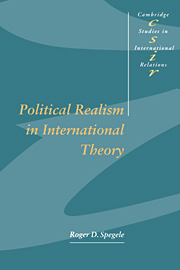Book contents
- Frontmatter
- Contents
- Preface
- Acknowledgements
- Part 1
- Part 2
- 4 Evaluative political realism: a beginning
- 5 State and state-systems in evaluative political realism
- 6 Evaluative political realism and human nature
- 7 Evaluative political realism and historical realism
- 8 Evaluative political realism as moral realism
- 9 Conclusion
- Notes
- Bibliography
- Index
- CAMBRIDGE STUDIES IN INTERNATIONAL RELATIONS
9 - Conclusion
from Part 2
Published online by Cambridge University Press: 30 October 2009
- Frontmatter
- Contents
- Preface
- Acknowledgements
- Part 1
- Part 2
- 4 Evaluative political realism: a beginning
- 5 State and state-systems in evaluative political realism
- 6 Evaluative political realism and human nature
- 7 Evaluative political realism and historical realism
- 8 Evaluative political realism as moral realism
- 9 Conclusion
- Notes
- Bibliography
- Index
- CAMBRIDGE STUDIES IN INTERNATIONAL RELATIONS
Summary
The Imperfect is our paradise.
Wallace StevensThe argument of this study may be usefully construed as dialectical if one can avoid, as one should, putting too much epistemological pressure on the word ‘dialectical’. Starting with certain assumptions and presuppositions derived from alternative conceptions of the subject, I have tried to show how, out of a process of asserting, denying and reasserting, a new kind of political realism - evaluative political realism - emerges to become a viable, coherent and incisive challenge to opposing conceptions of the subject.
The defence of evaluative political realism began with criticisms of two challenging alternative conceptions of the subject, positivistempiricism and emancipatory international relations. Using the relation of theory and practice as leitmotiv, I have argued that these conceptions generated difficulties with which they were unable to cope satisfactorily. In conceiving theory as speech requiring reconstruction in a formal language and practice as behavioural movement requiring linguistic reformulation as event-data (or in some comparable way), positivist-empiricism creates a yawning gap between two languages ultimately resulting in a stultifying scepticism it lacks the internal resources to resolve. Emancipatory international relations, on the other hand, sees itself as developing a conception of the world which, in claiming to unite theory and practice, is supposed to show, incontestably and irrevocably, just where international relations (and the social practices with which it is bound up) has gone wrong and how it can only be radically improved by planning for its own self-destruction.
- Type
- Chapter
- Information
- Political Realism in International Theory , pp. 230 - 244Publisher: Cambridge University PressPrint publication year: 1996

